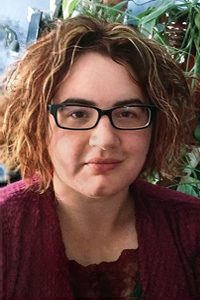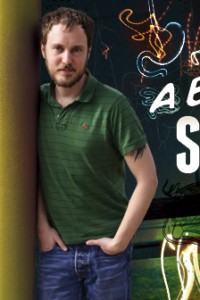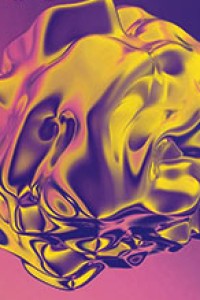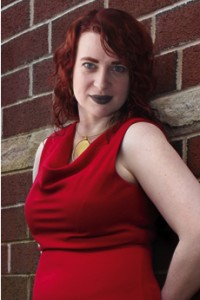Kameron Hurley: Measuring Life in Keurig Cups
 I spent all summer building a pond in the backyard with my spouse. It was the perfect project to take my mind away from the world outside of the fence, a world I increasingly only experience virtually.
I spent all summer building a pond in the backyard with my spouse. It was the perfect project to take my mind away from the world outside of the fence, a world I increasingly only experience virtually.
I could try and avoid the news, but the news is the world around me. The news is neighbors who have big parties. The news is the asshole at the grocery store who refuses to wear a mask. Watching a government fail – spectacularly – to protect its citizens and watching citizens blatantly put themselves and others in harm’s way, with no thought for their own future or anyone else’s, has made me very, very tired.
I believe there’s a lot of good that humanity can do. I know that there’s plenty of good out there. But seeing and hearing the bad all day, every week, every year, was wearing me down. I needed to make something, create something with my own hands that made the world a prettier and more interesting place, even if it was just my little corner of it.
We had envisioned the place where the pond would be in our yard, back when we first bought the house ten years ago. We planted three birch trees and positioned two stone benches with the intent that one day those birches would frame a pond, and those stone benches would overlook it.
For ten years, we built the yard bit by bit, with this vision in mind.
Then, this summer, we started digging. We did a lot of digging. We hauled a lot of rocks. Moved a lot of dirt. As the days got warmer, our work slowed down, but we kept at it.
We kept at it because, with each shovelful of dirt or bag of rocks, this idea of the pond that we had in our heads slowly began to work its way into the physical world. Ten years of thinking about it, envisioning it, and we were making it. Incredible.
As we rolled boulders across the lawn and got the plumbing all hooked up, I realized I was measuring the time passing by how far along we were on the pond project. Without the forward momentum on the project, days often ran one into the other.
We are both high risk for COVID-19 and haven’t left the house much since March. We make no plans for the future because right now there is no future beyond this one, day after day, again and again.
So we built a pond.
I ordered pond plants, and tadpoles, and snails that eat algae. I treated the water with chlorine remover, beneficial bacteria, and barley straw. Slowly, as the summer moved on, so did the project, until about mid-August. It was then I found myself pouring pea gravel and mulch around the edges, adjusting some plantings in among the stones of the waterfall spillway, and realized that the project was coming to a close.
In that moment, I felt a deep sense of loss. It was like the feeling of finishing a novel: that rush of joy and achievement followed by a crushing depression, a void. The pond was my quarantine project. The pandemic has outlasted it.
I sat around the pond the other night looking at the water lilies, and remembering the story of Monet painting while listening to the bombardment of a nearby city during World War I. I’ve thought of this story a lot during the last four years, but perhaps never more than now. Whenever I feel out of control, I remind myself that all I have to control is how I spend my own time. Do I choose to stay in bed and nurse my grief forever? Choke on my disappointment in the people around me? Or do I build a pond?
There’s a quote from Paul Harvey that goes, “During times like these, it helps to remember that there have always been times like these.” Whenever I get lost in thought about the looming political horror all around me, I stop and ask myself: “Am I physically all right, in this moment? Is everything okay here, in this moment? Do we have enough to eat? Clean water? A place to sleep? Are we caught up on the mortgage? Do I have the physical ability to write?”
Centering my thoughts on the present moment helps me maintain greater focus on the tasks that need to get done, and on the opportunities for creating something beautiful out of something horrible. Dwelling too much on “What comes after this?” can stop me in my tracks for hours, or whole days, because the possibilities are so vast – and often, seem to point toward a long period of darkness.
Especially now, as the days shorten.
And so, as the light lessens, I find myself casting around now for another quarantine project, something to last me until February, when I can start planting garden seeds in my cold frames again. Maybe I’ll start painting again, not the water lilies that entranced Monet, but the verdant woods and towering mountains I miss from my childhood in the Pacific Northwest. Moody beach scenes. Great tangles of blackberries. I miss the beach. I miss my friends. I miss the idea of a future that can be planned beyond the next season.
I find myself looking for new ways to measure the passage of time. I eye the empty Keurig coffee pods like T.S. Eliot’s proverbial coffee spoons, watching them pile up morning after morning. Individual pierces of writing aren’t a good measure, for me, as they tend to blur together. When I complete a book, unlike a more tangible project like the pond, I tend to forget most of what I’ve written. While that can make for amusing experiences when re-reading my work, it’s not as satisfying as, say, digging a hole and making something beautiful out of it.
Yesterday my spouse worked on stabilizing our grill station, which had been blown over and bent by the wind numerous times. He installed two-by-fours to square and straighten the bottom and re-hang one of the shelves. The grill station is a meaty thing now, substantial, ready to take on our shearing winds again.
Today I started researching how to build my own potting bench. Not like the small converted table I have outside now, but something equally as substantial as the reinforced grill station. A hulking corner unit, perhaps, with two five-foot long tables, one side slatted to allow soil to spill below. A work station where I could continue to make the world more beautiful, repotting plants, sowing seeds, nurturing seedlings, looking toward some indeterminate future.
Because, while there are many uncertainties in the future ahead, there is one irrevocable fact, and it is that there will be a future. The future is coming for us all the time.
I know that the work I do is valuable; not just the rock hauling, and the pond building, but the writing, too. I know that progress isn’t a straight line. I know that life is punctuated by periods of hope and despair.
The trick is in learning how to get through the despairing parts.
It’s a trick I’m still learning.
Kameron Hurley is the author of The Stars are Legion and the award-winning essay collection The Geek Feminist Revolution, as well as the God’s War Trilogy and The Worldbreaker Saga. Hurley has won the Hugo Award, Kitschy Award, Locus Award, BFA Award, and Sydney J. Bounds Award for Best Newcomer. She was also a finalist for the Arthur C. Clarke Award, the Nebula Award, and the Gemmell Morningstar Award. Her short fiction has appeared in Popular Science Magazine, Lightspeed Magazine, and many anthologies. Hurley has also written for The Atlantic, Bitch Magazine, The Village Voice, and Entertainment Weekly. She posts regularly at KameronHurley.com.
All opinions expressed by commentators are solely their own and do not reflect the opinions of Locus.
This article and more like it in the October 2020 issue of Locus.
 While you are here, please take a moment to support Locus with a one-time or recurring donation. We rely on reader donations to keep the magazine and site going, and would like to keep the site paywall free, but WE NEED YOUR FINANCIAL SUPPORT to continue quality coverage of the science fiction and fantasy field.
While you are here, please take a moment to support Locus with a one-time or recurring donation. We rely on reader donations to keep the magazine and site going, and would like to keep the site paywall free, but WE NEED YOUR FINANCIAL SUPPORT to continue quality coverage of the science fiction and fantasy field.
©Locus Magazine. Copyrighted material may not be republished without permission of LSFF.








right on!!
P.S.
Have just recently discovered your SF, something great to read right now. I’ve been reading sf for some 60 years, starting out with Sturgeon, Asimov, Clarke, Zelazny etc all those guys. Am really enjoying your stuff.